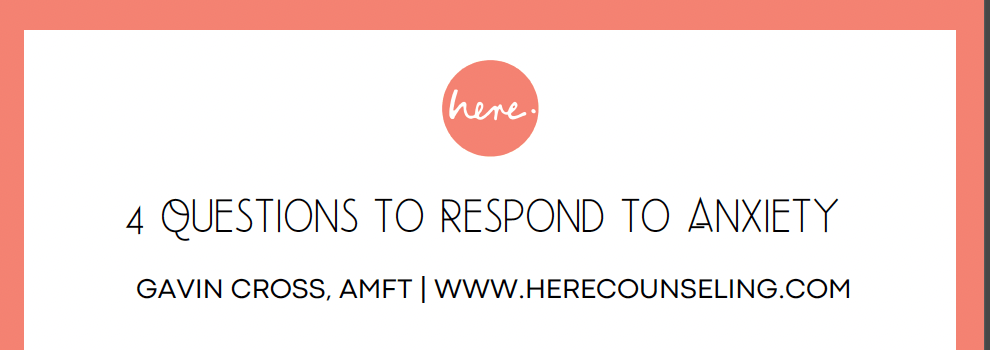Anxiety is that pesky companion that wants to rob you of your control in life.
- It hijacks your thoughts during important moments.
- It tenses your shoulders, your chest, and your digestive system.
- It over activates your “what if” fears.
- It can affect your sleep, diet, and ability to stay present and attentive to life.
You want to take a deep breath, rest once in a while, to be assured that somehow everything will be okay, but Anxiety’s “what if” voice has your amygdala doing somersaults, taxing your nervous system with a constant, low-volume version of fight or flight.
Anxiety’s Master Plan
Anxiety is most successful at taking over if it can convince you there’s something in your life that isn’t secure or loved. Your amygdala may automatically trigger your fight or flight response when you feel unsafe or unloved.
Fight or flight is beneficial when you are in present physical danger. Your digestive system shuts down, your logic and reasoning are dulled, blood rushes to contracted muscles, and your heart rate increases, so you can expend the energy where it matters when in danger: getting to safety.
Fight or flight is less helpful when you’re worried about a promotion, when you don’t know if you and your partner see eye-to-eye, when a difficult test is around the corner and you aren’t sure if you studied enough.
We want to turn down the volume on Anxiety’s voice of unsafety and insecurity. Turning down the volume will help you gain a little more control over when you need your amygdala’s essential function and when you don’t. The way to turn on the brain’s logic center is by asking ourselves four crucial questions.
4 Important questions to regain control from Anxiety
1) WHAT AM I FEELING IN REGARDS TO MY SECURITY AND SENSE OF BEING LOVED?
Anxiety’s power is in convincing you that things cannot be okay. Its voice is always found in an unhelpful statement about yourself:
- Something’s wrong with me.
- I’m not enough.
- It’s hopeless.
- I’m not wanted.
- I should have known better.
- I’m a failure.
This list is not exhaustive. There are many potential unhelpful messages that Anxiety may be trying to tell you about yourself.
For some, this first question will be the hardest of the four, but it’s essential to start here with Anxiety’s voice so you know how to speak to it. Behind your racing heart, behind your fear of calling that parent, behind your worry about what someone else is thinking, there is an unhelpful voice trying to convince you something negative about WHO YOU ARE. Try in this first step to name that message.
2) WHEN I FEEL THIS WAY, HOW DO I NORMALLY RESPOND?
Anxious symptoms and behaviors are a response to those unhelpful messages that Anxiety wants you to believe about yourself. If you’re convinced you are unwanted, you may struggle with sleeping or what you eat. When feeling hopeless, you may respond in outrage. If you feel like a failure, you may give up or spend hours thinking through a problem instead of experiencing peace, rest, and a solution.
You’ll win the battle against Anxiety when you can 1) name the negative message about your security and sense of being loved, and 2) when you can name how you are tempted to respond to the aforementioned negative message. Here is a small list of potential examples:
- Excessive worry
- Self-medication (drugs, alcohol, sex, TV, video games, etcetera)
- Racing thoughts
- Lashing out
- Giving up
- Fatigue
- Body symptoms
- Feeling on edge
- Changes in diet
3) WHAT’S POSITIVE AND TRUE ABOUT ME?
Here’s where you can consciously choose to divert your attention to evidence that contradicts Anxiety’s unhelpful voice, where you entertain thoughts that are more true about who you are. If this step is difficult, you can begin by journaling about times the negative message was untrue about you. Eventually, practice diverting to these more positive messages in the middle of Anxiety’s advances to lessen its power.
- There are plenty of reasons to hope.
- I have proven I can succeed.
- I will get through it.
- I did the best I could.
- There’s reason to believe I am loved and cared for.
4) HOW WOULD I RATHER RESPOND?
Through knowing the truth of who you are and the strength and love inside of you, you have now turned down the volume on Anxiety’s unhelpful voice and can choose more helpful behaviors and fewer body symptoms.
- Practice deep breathing and mindfulness.
- Give attention to the people around you instead of to the problem.
- Improve eating and sleeping habits.
- Enjoy soothing behaviors like TV, alcohol, etc., in a healthier, non-excessive way.
- Complete tasks efficiently with a more solution and strength-based mindset.
How do I know when I need therapy?
Anxiety can be a formidable adversary to fight. Maybe you want a coach to walk you through these four steps. Or perhaps you’d like a little help looking underneath the unhelpful messages, understanding the deeper unconscious drives that have led to some of the symptoms you experience.
There’s no harm in asking a therapist for a free consultation to see if you might be a good candidate for a little extra help. All therapists at Here Counseling offer free consultations, and if we’re not the right therapist for you, we can help you find someone who is.
You’ve got this!
Integrate these four questions into a regular routine.
- What am I feeling in regards to my security and sense of being loved?
- When I feel this way, how do I normally respond?
- What’s positive and true about me?
- How would I rather respond?
Eventually, you’ll be able to quickly cycle through these four questions in the middle of a stressful experience, utilizing the empowerment of truth to turn down the volume on Anxiety’s unhelpful messages, and living in the peace and accomplish you long for.

Questions to Respond to Anxiety Worksheet
Want these questions in an easy to use free downloadable worksheet? This worksheet will help you take steps forward in dealing with anxiety. You’ll also get access to all our worksheets in Here Counseling’s Resource Library!
Reference:
Hargrave, T. D., & Pfitzer, F. (2011). Restoration therapy: Understanding and guiding healing in marriage and family therapy. Routledge.

